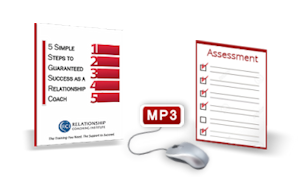 The most common “uncoach-like” behavior displayed by trainees early in their coach training is to provide a suggestion or POV in response to their client’s situation.
The most common “uncoach-like” behavior displayed by trainees early in their coach training is to provide a suggestion or POV in response to their client’s situation.
Why? I understand that you really want to help and empathize with the impulse to simply blurt out what you think your client needs to do or understand, but leaving your coaching lane and dis-empowering your client to do so is simply unskilled and ineffective coaching, and our trainees usually know that, but don’t know what else to do in the moment.
Their plaintive response often is “I didn’t know what question to ask!” and then request a list of possible coaching questions for the situation they encountered.
A simple strategy for a common situation is much more useful and important than a list of questions or a suggested “best question for this situation” because 1) you can’t remember them all, and 2) referring to a “list” is a crutch that kills your ability to use your coaching skills and coach competently.
As a trainers and mentors, we believe that providing alternative questions is not that useful and that learning from a mistake by consciously selecting a Strategy for future situations is your best bet.
Here’s a suggested strategy for “I didn’t know what question to ask!” –
Convert “Un-Coach-Like” Statements into Coaching Questions
Scenario- your reaction to your client is a strong judgment that your Coaching Superpower tells you is important to focus on in service of your client. Your judgment almost always presents itself internally as a statement, such as “Come on, surely you must realize that you can’t control others, right?”
Of course you don’t say that, but you clearly see that your client needs to be more aware of what they can control and how they can best respond to stressful interpersonal situations, so your Coaching Superpower tells you to help them explore that.
Primary Strategy: Any statement can be converted into a coaching question.
So “You can’t fix other people’s problems” becomes something like “How can you best support your friend in this situation?”
“You can’t control what other people think, feel, or do” becomes something like “How can you respond effectively in this situation?”
Both of the questions above are intended to open up an exploration of awareness and options for decision making and are NOT intended to, or likely to result in, a magic, best answer right away.
The ability to convert your internal judgments and statements into productive coaching questions is pretty easy to develop with a little practice and avoid this common “un-coach-like” behavior forevermore.

